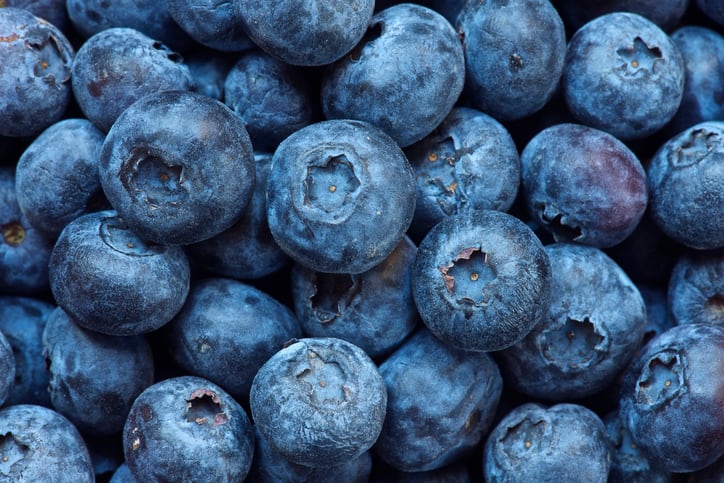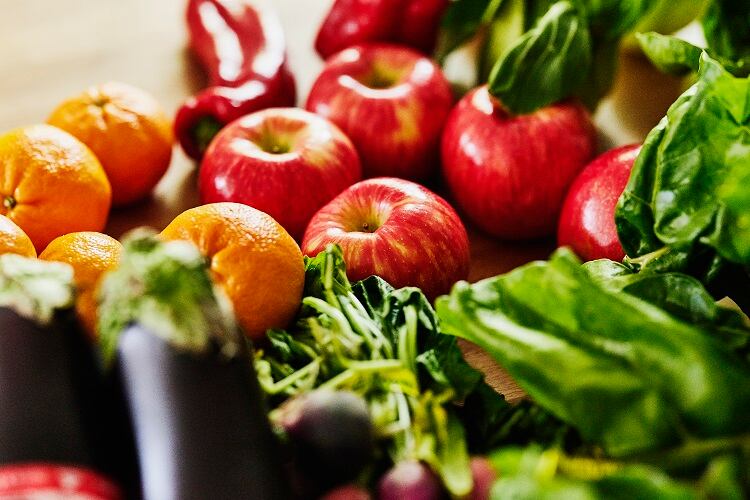Blueberries are one fruit prized by consumers for their superfood status. The global blueberry market was valued at over $8 billion (according to IndexBox in 2021). It is expected to grow and reach 2.3 million tons by 2030.
But growers face challenges. Changing climate equals inconsistent seasonality. Waste is another. British consumers, for example, throw out £245 worth of fruit a year because they don’t eat it in time, according to the beverage brand Discarded Spirits, last year. Its research last year found that over the course of a year, the average British household will throw out 336 blueberries – the equivalent of approximately five punnets.
The food tech firm hopes to counter these issues with new technology called Vidre+, which slows down the ripening of blueberries and other fruit and vegetables to extend shelf life.
It works via stickers which are put inside the packaging. These stickers slowly release 1-MCP (a cyclopropene derivative used as a synthetic plant growth regulator) which protects the berries from the ripening effects of ethylene.
The gradual release mechanism allows produce to be treated by 1-MCP directly in packaging, eliminating the need for 24-hour application in a sealed storage room or air-tight containers.
Fresh Inset pointed to recent trials in Poland, led by Dorota Wichrowska from the University of Life Sciences in Bydgoszcz, that demonstrated the impact of Vidre+ technology on blueberries. Those treated with 1-MCP Vidre+ stickers lost less weight and kept better eating quality and firmness for a longer time compared to untreated ones.
“The technology has demonstrated a positive impact on freshly harvested blueberries, which is marked by reduced weight loss, improved overall quality, extended fruit firmness, and better retention of essential elements like Vitamin C and antioxidants,” said Fresh Inset CTO Tim Malefyt.
The technology preserved more Vitamin C and antioxidants than untreated berries
Throughout the test period, treatments with Vidre+ exhibited a 2-3% reduction in weight loss compared to the untreated group.
Treated fruits maintained excellent eating quality throughout 35 days of the experiment and kept very good eating quality for the full 49 days of the test. Untreated fruits began to soften after 21 days vs. after 35 days for treated fruit. After 28 days in cold storage, treated blueberries had 83% more Vitamin C and 33% higher antioxidant levels.
The trials showed that berries protected with Vidre+ stayed fresh and firm preserving more Vitamin C and antioxidants ten days longer than untreated berries, which began softening after only four days. Fresh Inset estimated that Vidre+ could save up to 9.46m tonnes of fruit and vegetables annually.
The sticker technology can also prevent grey mould, which is another challenge for growers, Malefyt told FoodNavigator. “The active ingredient of Vidre+ stickers (1-MCP) is not a fungicide and therefore does not directly affect grey mould (Botrytis cinerea),” he explained. “However, as ethylene causes fruit to soften and lose quality over time, it becomes more susceptible to grey mould infection and infestation. Vidre+ protects fruit firmness and quality and as a result, researchers have observed reduced grey mould growth on berries protected by Vidre+.”
Vidre+™ is not yet approved for use in Europe. Fresh Inset is working through the EU approval process so that the technology can be used within the EU to protect against food waste. Vidre+ is already used in Argentina and is awaiting regulatory approval in key food production markets including the Americas.
Fresh Inset is aggressively evaluating Vidre+ on over 20 different crops
The technology can potentially be used on other crops, he added, claiming the research conducted on 5 continents proves that the technology works on various crops and varieties from avocados to grapes, limes, pears, tomatoes, peppers.
“Ethylene is a naturally occurring plant hormone that occurs in all fruits and vegetables. Ethylene helps produce grow and ripen, but after harvest causes over-ripening and spoilage. Vidre+ utilizes 1-MCP technology to block harvested produce from sensing ethylene, which slows down these negative effects caused by ethylene. Since our Vidre+ technology is useful in all types of produce packaging systems, Fresh Inset is aggressively evaluating Vidre+ on over 20 different crops and produce categories and has seen benefits across many new crops where previously first-generation 1-MCP products have not been used.”
Other companies have tried to use 1-MCP products inside packaging. Fresh Inset, however, claims to have patented a unique delivery system which allows for triggered release of the product inside packaging, where the release begins after 2-3 hours. Vidre+ continues to slowly release 1-MCP over a 30-hour period. “The effectiveness of 1-MCP is related to dosage and exposure time. Competitive products release 1-MCP more quickly and dissipate more quickly, which fails to provide adequate exposure time,” the CTO told us.
“Other products try to address the ethylene problem via sachets of chemical ethylene absorbers used inside the packaging. While these products do absorb ethylene, they fail to capture all the ethylene and thereby allow some ethylene to bind to receptor sites to begin degradative biochemical processes caused by ethylene.”
The stickers, he added, can be easily applied at the pack house by hand or by machine or packers can request their packaging supplier to supply packages which already include the sticker technology. “For example, in blueberries, the packaging supplier can supply clamshells or punnets that already have a sticker applied to the bottom or lid of the package.”
Sticker cost will vary according to size and will be appropriate to deliver a very high overall return on investment to the packer or grower.



